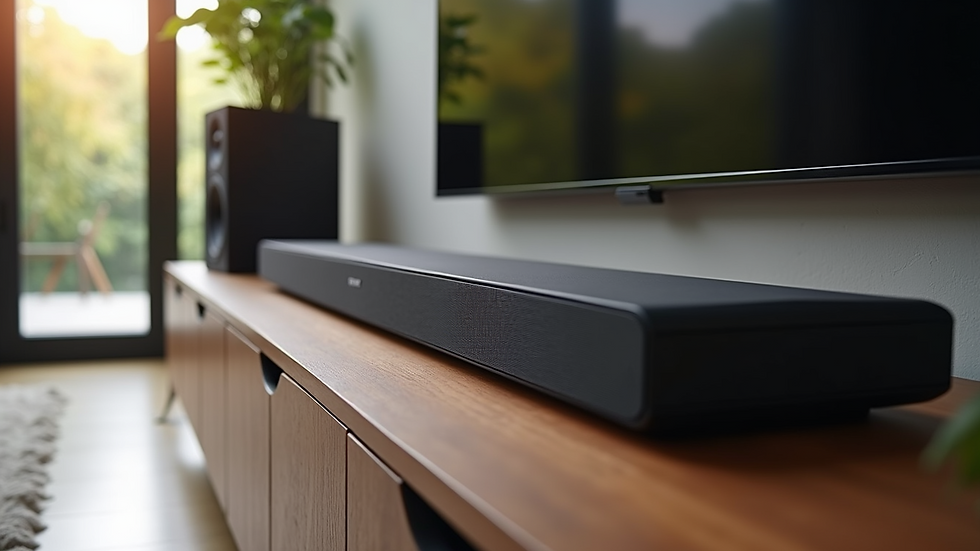How Smart Home Technology Enhances Everyday Living
- Ravi Amirtham
- Nov 5, 2025
- 4 min read
Smart home technology is transforming the way we live, making everyday tasks easier, safer, and more efficient. With the rise of connected devices, homes are becoming more intuitive and responsive to our needs. This technology integrates various systems like lighting, security, climate control, and entertainment into a seamless experience controlled from a smartphone or voice assistant.
By adopting smart home solutions, you can enjoy greater convenience, energy savings, and peace of mind. Whether you want to automate your morning routine or secure your property remotely, smart home technology offers practical benefits that improve your quality of life.
The Impact of Smart Home Technology on Daily Life
Smart home devices simplify many routine activities. For example, smart thermostats learn your schedule and adjust the temperature automatically, reducing energy consumption without sacrificing comfort. You can also control lighting with voice commands or set schedules to mimic your presence when you are away, enhancing security.
Security cameras and smart locks allow you to monitor your home in real-time and grant access to trusted visitors remotely. This is especially useful for busy households or those who travel frequently. Additionally, smart kitchen appliances can help you prepare meals more efficiently by providing step-by-step recipes or preheating ovens remotely.
These technologies not only save time but also reduce stress by automating mundane tasks. The integration of devices into a single platform means you can manage your entire home environment effortlessly.

Exploring Smart Home Devices and Their Benefits
Smart home technology includes a wide range of devices designed to enhance comfort, security, and energy efficiency. Here are some popular categories and their advantages:
Smart Lighting: Control brightness and color remotely or through voice commands. Set schedules to save energy and create ambiance.
Smart Thermostats: Automatically adjust heating and cooling based on your habits, reducing utility bills.
Security Systems: Monitor your home with cameras, motion sensors, and smart locks accessible via mobile apps.
Voice Assistants: Use devices like Amazon Alexa or Google Assistant to control other smart devices, play music, or get information hands-free.
Smart Appliances: Refrigerators, ovens, and washing machines that can be controlled remotely or provide alerts for maintenance.
By integrating these devices, you create a connected ecosystem that responds to your lifestyle. For example, a smart doorbell can notify you when a package arrives, while your smart lights turn on automatically as you enter the house.
To explore more options and find the best solutions for your home, consider checking out what home automation offers.

Enhancing Home Security with Smart Technology
One of the most significant advantages of smart home technology is improved security. Traditional security systems often require professional installation and monitoring, but smart security devices are user-friendly and customizable.
Smart cameras provide live video feeds accessible from anywhere, allowing you to check on your home at any time. Motion detectors can trigger alerts or turn on lights to deter intruders. Smart locks enable keyless entry and can be programmed to allow temporary access for guests or service providers.
Moreover, integration with voice assistants means you can arm or disarm your security system using simple commands. Notifications sent directly to your phone keep you informed of any unusual activity, giving you peace of mind whether you are at home or away.
For families, smart security systems offer an added layer of protection by monitoring children’s arrivals and departures from school or activities. This technology also supports emergency response by connecting to local authorities quickly if needed.
Energy Efficiency and Cost Savings with Smart Homes
Smart home technology is not just about convenience; it also plays a crucial role in reducing energy consumption and lowering utility bills. Devices like smart thermostats, lighting, and appliances optimize energy use by adapting to your habits and preferences.
For instance, smart thermostats can detect when no one is home and adjust the temperature accordingly, preventing unnecessary heating or cooling. Smart lighting systems use sensors to turn off lights in empty rooms and can be scheduled to operate only during specific hours.
Many smart appliances come with energy monitoring features that provide insights into usage patterns, helping you make informed decisions to save power. Over time, these small adjustments can lead to significant savings and contribute to a more sustainable lifestyle.
Additionally, some smart home systems integrate with solar panels or energy storage solutions, maximizing the use of renewable energy sources.
Making Everyday Living More Comfortable and Convenient
Smart home technology enhances comfort by automating daily routines and providing personalized control over your environment. Imagine waking up to lights that gradually brighten, your coffee maker starting automatically, and your favorite music playing softly.
Voice-controlled assistants allow you to manage multiple devices without lifting a finger. You can adjust the thermostat, lock doors, or check the weather simply by speaking. Smart blinds can open or close based on the time of day or sunlight intensity, improving natural lighting and privacy.
For those with mobility challenges or busy schedules, these features offer independence and ease. Smart home technology also supports entertainment by connecting speakers, TVs, and streaming services into a unified system.
By customizing settings and creating automation rules, you can tailor your home to fit your lifestyle perfectly.
Embracing the Future of Living with Smart Homes
The evolution of smart home technology continues to bring new possibilities for enhancing everyday life. As devices become more affordable and user-friendly, more households are adopting these innovations.
Future developments may include greater integration with artificial intelligence, allowing homes to anticipate needs and preferences even more accurately. Enhanced security features, energy management, and health monitoring are also on the horizon.
By investing in smart home technology today, you are not only improving your current living experience but also preparing for a more connected and efficient future.
Explore the options available and consider how smart home solutions can transform your daily routine into a seamless, enjoyable experience.



Comments